Introduction
Here’s my take on one of the most important aspects of developing young players: Player Tutoring. There are a lot of different articles and blogs out there about tutoring, and there’s a lot of a great advice in many of them. I thought I’d offer my take on it here, as it’s a vital part of what I believe is the most interesting and enjoyable aspect of the game, which is Player Development.
What is it?
Tutoring is one of those areas that’s often difficult to explain, because it deals mostly with things you can’t always see. But when done correctly, Tutoring will greatly aid the development of young players, and it’s always the first thing I consider when trying to nurture the next young superstar.
Tutoring is simply the act of having an older player teach a few things to younger players. So, what do they teach? Some people argue that Tutoring can improve some hidden attributes (such as Consistency, Dirtiness, Important Matches etc.) but people I trust say that’s not true (see the comments) and I’ve never seen evidence of it, but everyone agrees that there are a few things that are definitely influenced by Tutoring. These are:
- Personality
- Determination
- Media Handling
- Preferred Moves
- Current Ability
If Tutoring is successful, a young player should take on some aspects of some of, or all of, the above attributes of the older player. So a young player’s Personality should change to resemble that of the older player, their Determination should either increase or decrease to more closely match their Tutor, their Media Handling, as with Personality, should change to something more closely resembling the older player, and they may in some cases take on one or more of the Preferred Moves of the older player. Additionally, I didn’t know until recently (again, see the comments) that young players Current Ability will improve just from the act of being Tutored, so that’s a pretty good reason to use the function alone.
Why should you use it?
I think Personality development is something that’s often very undervalued by FM players. Most people know it’s there, but I don’t think a lot of people really appreciate what it can do for players as individuals, but also as a team. For a guide to all the different personality types, take a look at this excellent piece here, or if you want the exact numeric values that give you each personality, have a look at this equally good resource here.
A strong personality in a player can mean he’ll train harder, meaning that if he’s a young player, he’ll improve faster. This is a massive benefit to have, if you can have players ready for your first team by the time they reach 18 or 19, you’re going to have the benefit of a quality player for a long time. But that’s not the only benefit. A player with strong personalities can react better to interactions and team talks, and be better at maintaining his morale, while a weak personality will make the player more likely to have poor reactions to interaction, more likely to request a new contract or a transfer, and make him a disruptive influence in the team.
Equally, a team full of players with strong personalities gives you even greater benefits. They’re more likely to have uniform reactions in team talks and press conferences and they’re more likely to have good Squad Harmony and maintain their team morale. Finally, while there’s no way of proving it, I’ve found in my save that having a highly professional squad has helped my team bounce back from defeats, and even made them more likely to stage comebacks from being behind at half time. So creating a team full of players with strong personalities is a great way to play the game, it’s certainly made my current save much more interesting
Who can do it?
I always used to think it was just the age and positions of the players involved that mattered when looking at who can tutor and who can be tutored but that’s not the case. Having done a bit more investigation into the subject and having tried various things myself, I’ve found a couple of different things you have to consider when looking at who can be a Tutor to whom, and they are:
- Age
- Player Reputation
- Position
- Squad Status
Age
Firstly, the player who is doing the tutoring (the Tutor from now on) has to be at least 23 years of age. The player who is being tutored (the Tutee from now one) has to be under 23 years of age. That’s it, there don’t seem to be any other limits with regards to age, you can tutor someone who is 15 or 22, and anyone can be a Tutor as long as they are over 22 years old.
Player Reputation
The Tutor must have a higher reputation than the Tutee. Now I don’t know if there has to a significant difference between the two, that might be the case, but I’ve never found an issue with it personally. Reputation is slightly difficult to judge, because while it is a numerical value, the only way we can judge it in the game is through the description we’re given in Player Information. This means you could have two players with the same description, but different enough numerical values that tutoring is possible. It’s difficult to judge exactly, but if you can’t tutor one player with another, then Reputation might be the reason – if the potential Tutee’s Reputation is higher then or equal to the potential Tutor, you’re out of luck.
Position
You probably already know that you can’t tutor one player with another player if they play completely different positions. It’s just common sense really, it would be strange for a Left Back to try and tell an Advanced Playmaker about the mental side of the game that’s needed in their position.
However, players don’t have to share the same natural position. As long as the potential Tutor has a decent level of competency in a position (I believe that have to be a least at the Competent level) then they should be able to tutor a youngster. For example, if I’ve got a player who’s a natural Centre Back, but he’s a competent Central Midfielder, I could use him to tutor one of my young Central Midfielders if I believe he’s the right man. So remember, don’t limit yourself to players who share a natural position, always look for the best player, not the most convenient.
Squad Status
This is one area I haven’t seen many people discuss in their works on tutoring, it could be that it’s new to FM13, or it could be that I hadn’t noticed others talking about it before, but from what I’ve found, squad status matters.
Firstly, your Captain can tutor players no matter what his age is – if your Captain is 21, he can become a Tutor straight away, despite the usual requirement of players being 23. I don’t know if that holds true for Vice Captains as well, I haven’t seen that happen, but it may also be the case.
Secondly, and probably more importantly, I’ve found that a Tutor needs to have a certain squad status in order to tutor other players of a certain squad status. For example, I’ve found that a player with the status of a Backup Player cannot tutor a player who’s a Hot Prospect, they can only tutor Youngsters. Now, this could be linked to Reputation, as a player who’s a Backup Player could be given a lower numeric Reputation value by the game than those with a Rotation status, even if everything else is the same.
So, when you’re trying to tutor one of your young players, you’ll need to think about squad status. But unlike the other factors you need to consider, this is one you have some control over. If you want a player to tutor a youngster, and they currently seem unable to do this, you can try changing the squad status of either (or both) players.
Perhaps you have a Backup player who you want to tutor a Hot Prospect. Well, you’ve got a choice, you could promote the Backup player to Rotation status, or demote the Hot Prospect to Youngster. You have to be aware that this could have other consequences (unhappiness with a demotion, or asking for a new contract with a promotion) but if done well, it should enable you to now tutor your youngster, as long as they still meet the other criteria.
How is it done: The Basics
So that’s what it does and who can do it, and I’m sure a lot of you knew that already. But how is it done? I’ll start with a basic look at the mechanics of what happens, then I’ll go through how I go about deciding on a tutor and trying to ensure it works well.
Well it’s done through player interaction, but there are two different options here and they do slightly different things, so let’s take a look at the options. Deciding which option to pick can be very important depending on the player you’re tutoring.
Option One
This option seems to be the more common option from what I’ve seen and read. This option means the Tutee will attempt to learn everything they can from the Tutor, they’ll attempt to change in order to resemble the Personality, Media Handling, Determination and Preferred moves of the Tutor. They’ll also seek to build up a relationship off the pitch with the older player, which could result in a friendship going forward.
In essence, this is an all-of-the-above option. It’s probably the most common type of Tutoring used by many players, because it’s more likely to give you a sort of replica of your Tutor. One of the big advantages of this approach is that it’s more likely to result in a positive relationship developing between the two players involved, which will help improve squad harmony and (in my mind at least) will increase the understanding between the two players. Another great advantage is that there are some Preferred Moves that can only be transferred through tutoring (for a full list, take a look here) However, there are dangers to this approach, particularly with regards to Preferred Moves, which I’ll deal with later when we look how to approach the tutoring itself.
Option 2
This option is slightly different. As it says in the option, this deals with off the pitch tutoring only, meaning the Tutee will learn only the mental side of the game, rather than the on-pitch side. In practice, this means the Tutee will not learn the Preferred Moves of the Tutor. This is a very important difference between the two options which I don’t think is known widely enough, but it should have a big impact on how you pick your Tutors and how you use them.
The other difference I’ve found with this option is that Tutees often seem less enthusiastic about the experience afterwards. There seems to be less of a chance of the two players forming a positive relationship and becoming Favoured Personnel, and therefore less of a chance in the process giving you a bump in your Squad Harmony. However, that doesn’t mean that the players are more likely to have problems with each other, it simply means they’re less likely to develop that positive bond.
Which should you choose?
I don’t think that either option ‘works better’ than the other, I believe they both have the same chance of succeeding – depending on how you determine success, which I’ll discuss later. So which option you use is really about what you want from the experience, especially whether you’re looking to give your Tutees the Preferred Moves of the Tutor. The option you choose is an important part of deciding on how to proceed, but it’s not the only thing to consider.
It Takes Time
When using tutoring, don’t look for instant results, you’re much better taking a long-term view and working slowly. Don’t always jump to use your best Tutor for your worst player, by working slowly you’ll minimise personality clashes (something I’ll discuss later) and you’ll make sure that the Tutees take on everything they can from your best Tutors. Working this way will decrease problems and increase results, in some ways, this is the most important takeaway from this piece.
How I use Tutoring: A Case Study
So now you know what it is, why to do it, who can do it and how it’s done. Now I’ll show you how I go about deciding on a Tutor/Tutee partnership, what I consider and what I think success looks like.
*Note: Screenshots in this section are taken from two different saves. Whilst they are on the same patch, the young player Lewis Baker has a couple of random attributes including Teamwork, Stamina and Jumping. However, his Personality and Determination was the same between the saves, therefore the before and after shots are still good comparisons.
Picking the Tutee
This is probably the easiest part of the process. All you need to look at is who are the young players you’re looking to develop, and ask do they need tutoring? The answer to this question could be yes if:
- They don’t have the Personality you want
- They don’t have the level of Determination you want
- They don’t have the Media Handling you want
- You want to give them a Preferred Move
The top three things can only be improved by Tutoring (or very occasionally other interactions such as fines or press comments), whereas if they meet the top three criteria but not the bottom, you may want to consider just training them with the particular Preferred Move. However, if it’s a PM that can only be trained through Tutoring, then this option is the one for you.
The Tutee: Lewis Baker
Lewis Baker is a great young prospect coming through the Chelsea youth system. He’s got a four star potential ability according to coaches I trust, so he could form a valuable part of my team in the future, and I’m trying to develop him into a world class Deep Lying Playmaker in the years to come. So, I know he could become great, but do I need to tutor him? Well let’s take a look.
Determination
The most obvious and easy to judge attribute is Determination. There are a few arguments about exactly what this attribute does and how much influence it has, but in my mind, Determined players are more likely to both improve themselves and to work hard for the team. Now I’m pretty sure that Determination has no impact upon player improvement, unlike other attributes (Professionalism and Ambition being two important ones) but this is just how I play the game. In my mind, a player in real life who’s more Determined is more likely to work hard to improve himself, so while that’s not replicated in the game, it’s how I play the game, I play ‘between the lines’. Even among those who debate what it does, they all seem to agree that higher Determination is generally desirable. At just 10, Bakers’ Determination is a little low, so it looks already that Tutoring might be a wise move.
Personality
My main focus when looking at Personality is the level of Professionalism they have. With a Spirited personality, Baker clearly has some Professionalism, but it’s not incredibly high, which is always what I want. So he certainly could benefit from Tutoring, if it’s from the right player.
Media Handling
Baker’s Media Handling is already very good, he doesn’t need too much work, and I’ll need to make sure that if I tutor him, it’s with someone who will maintain or improve upon what he’s already got.
Preferred Moves
This is what he’s already packing in the PM department, and they’re both fantastic for a Deep Lying Playmaker, so I don’t need to do any work here. However, that doesn’t preclude him from being Tutored, it just means that I don’t need to go out and find someone to give him a particular PM.
Conclusion:
Baker could definitely benefit from tutoring, but only from the right player.
Finding the Tutor
This is the more difficult job. So here’s how I always go about it.
Positions
I always start with the position. Baker is a natural Central Midfielder, but he can also play on the wings, so let’s take a look at his possible Tutors in my squad:
Here are all the players that pay the same positions as Baker. However we have Romeu, Moses, Oscar, Hazard and Marin who are all too young to Tutor right now, so that rules them out.
Personality and Determination
So let’s look at the last three players in terms of what I’m looking to improve on Baker (Determination and Personality) what I’m looking to maintain (Media Handling). I’ll look at Preferred Moves afterwards, but they’ll be an added bonus here.
So what we see here is there are two real candidates. Mikel is out due to his ‘Outspoken’ Media Handling, that’s not something I want to encourage, while Mata wouldn’t really improve his personality, as he shares the same thing.
So that leaves Ramires and Lampard. While both are great tutors, it’s pretty obvious who is the better Tutor. If Baker’s Determination was lower, or his personality was any weaker, I would go for Ramires first to improve him a little, and then finish him off with some tutoring from Lampard. However, Baker is already decently developed, so I can go straight to Lampard here.
The reason I would go with Ramires first in some cases, is to avoid the problems you can offer encounter, which is players falling out with each other, not being able to learn due to the ‘clear personality differences’. The chances of this problem are minimised (though not eliminated) by using tutoring gradually. If you attempt to change a player with a really weak personality into one with a really strong one in one go, you’re more likely to suffer clashes. However, if you do it bit by bit, using multiple Tutors, you’re more likely to get success.
Which Option to Take?
So, which of the two Tutoring options should I take here? Well I’m already pretty happy with the Preferred Moves that Baker has, but could Lampard improve them?
Not really no. He has ‘Shoots from Distance’ which is definitely not what I want from my new Deep Lying Playmaker, nor do I want him to be bombing into the area too much. So in this case, it’s clear I want the second option.
The Process
So it’s time to make the ask. I know the Tutor, I know the Tutee, and I know the option.
Great, so that’s where it ends right? Not exactly. Here’s something that I think some people overlook.
Maximising The Impact
As with anything regarding Player Development, the more the younger player (in this case the Tutee) the faster their development will be. However, make sure they’re playing at the right level, don’t throw them into to the biggest games of the season as they won’t be ready and could suffer as a result.
Prior to writing this thread, I believed that playing the Tutors would give you better results as well, but as the debate has gone on in the comment section, I’ve learned that my experiences of poor results from non-playing Tutors seem to be more down to bad luck than the lack of playing time of the Tutors. So it shows that the more you play and read about FM, the more you’ll learn and the better manager you’re going to become. I’m really pleased this has generated a debate, and hopefully it will have benefited some people, it’s certainly helped me.
The Results
Season one:
So, what you can see straight away is he’s improved. His Determination is now 15, which is perfectly fine for me, I don’t need to improve it any more. And what’s helping that improvement along? He hasn’t had too many first team games, so it’s not that. It’s the tutoring, as evidenced by:
Baker is now a Model Professional, with an Unflappable Media Handling Style. That’s fantastic, Model Pro is one of the best Personality types out there and is exactly what I want from my players, and he’s retained his Media Handling style. Although he didn’t gain a relationship with Lampard, that doesn’t bother me much, the tutoring did exactly what I wanted.
Season three:
Here’s how he looks right now. That’s after one season out on loan, and one season in the First Team fold. He’s at two stars of his four star potential, and his progression has been pretty outstanding. I never thought he’d be ready for the first team so quickly, but I think it’s a great example of just what tutoring can do. Now I’m not only comfortable with using Baker regularly, I know that in the future he can be a great Tutor as well
The Results of Tutoring – Players Don’t Know What’s good for them
One other thing to add in, is that a lot of players pay too much attention to the news item that comes up at the end of the Tutoring period. I’d advise against this. Most of the time, a player will say something like this:
While he may be a little disappointed, Devonshire’s Determination improved to 20 and his Personality is now Professional, so the Tutoring had the exact effect I wanted. What I would say is don’t ever judge a tutoring period by these messages, judge it yourself and look at whether it accomplished the goals you set yourself at the start. As with many things in the game, trust your instinces.
Conclusions
I hope this guide to tutoring is helpful, but if there’s one thing you should take away, is that as with all things on FM, tutoring is always an ongoing process. You should never think in the mindset of ‘one and done’, some players will need more than one Tutor and there’s nothing wrong with that. Taking as a gradual process will help you produce the best results, so work slowly and methodically, and you’ll produce fantastic players for your first team who can go on to become great tutors themselves.

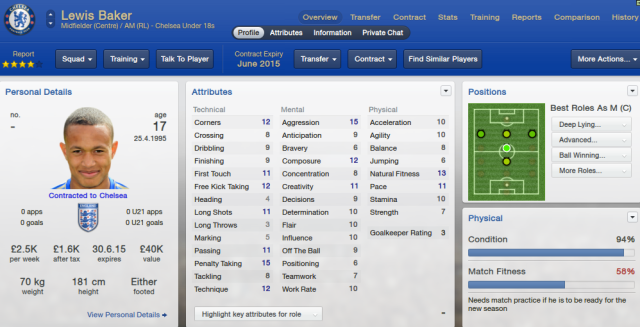
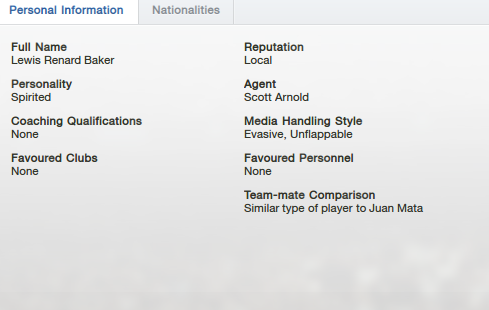

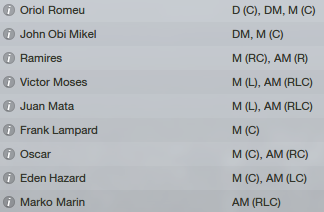

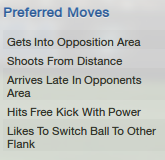
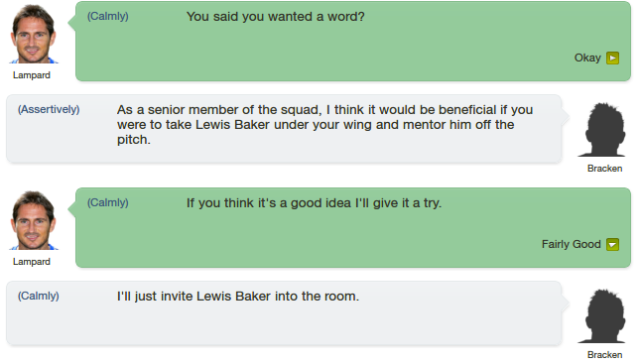
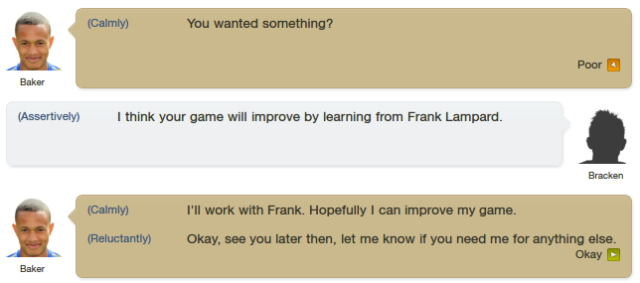
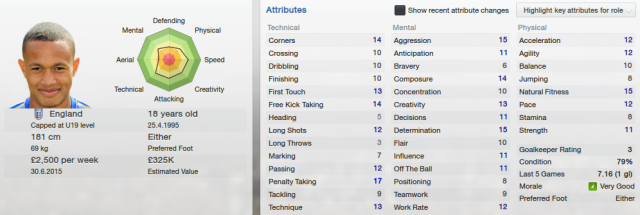
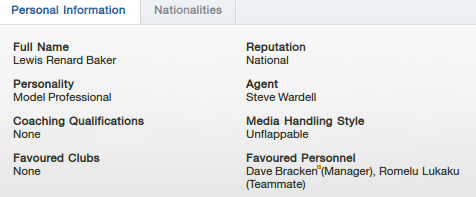


Good article and a subject close to my heart although I have a couple of questions / points:
1. You partially raised the question at the very start but tutoring does not impact the hidden, non-personality attributes . By which I mean – Consistency, Dirtiness, Important Matches, Versatility. Disappointing as I hoped it would but I’m afraid there’s no impact.
2. You mentioned at one point that you felt players with high determination develop better. Determination doesn’t affect development. As you say, still a handy attribute but not one which has any impact on how likely a player is to reach his CA. This is dictated by professionalism, ambition, game time, morale and luck.
3. You mention that players won’t learn as much from a tutor who doesn’t play regularly? Do you have any evidence to back this up as I have never noticed any difference whatsoever and I regularly buy older players solely for tutoring purposes, often they won’t play a single game.
It might also be worth mentioning that tutored players get a CA bump just from the tutoring, regardless of the other effects.
Reading the above, it sounds like a harsh response and it isn’t intended that way – just a few clarifications really.
Hi mate, thanks very much for the comments.
1. As I said in the piece, I wasn’t completely sure on this one so thanks for confirming, I didn’t think it did but as it’s so difficult to tell, thought it was worth mentioning as I’ve seen people argue that it can improve these attributes, but if not then I’m happy to amend the post to make that clear.
2. I’ve heard a lot of contradictory opinions on this one (I know people used to swear that it did help them improve) but if you’re sure then I’m more than happy to edit the post, I’ve read a lot of your stuff in the past and trust you, so I’m happy to edit that one too.
3. I haven’t tested it thoroughly, but from my experiences (particularly in FM13) that’s what I’ve found. I’ve had two players in Benayoun and Hargreaves who had fantastic attributes for a tutor, but because they were backup players for me their Tutees just didn’t really improve – not that they didn’t improve at all, but they certainly didn’t improve to the extent you’d expect, and each player had at least two players learn from them. My other experience in this is Lampard, a fantastic Tutor who never failed to improve players until he began to decline and get much less game time, at which point his Tutees really just ceased to improve. I’ve also seen the same effects from players whose Tutor has gotten injured, though I’m not sure if that’s about game-time or simply that injury can impact tutoring. As I say, not a scientific study in any way, but it’s certainly been my experience on FM. Interesting that you’ve not found any difference, I’ll perhaps change this in the piece to reflect this discussion
4. I genuinely didn’t know that players got a CA bump just from the tutoring! Thanks for that, I always assumed it was a result of the other benefits of tutoring and the general progression of the player, I don’t check actual CA values so that’s great to know.
Thanks a lot from the comments, the more discussion the better so don’t worry about seeming harsh, I appreciate any comments coming my way
No problem at all. I’ve done quite a bit of research into tutoring so I can say points 1 and 2 are definitely fact. See here http://footballmanagerveteran.wordpress.com/2012/08/21/shrews-guide-to-tutoring-in-fm/ and here http://www.thedugout.net/community/showthread.php?t=67502
Particularly the latter for the determination research.
On point 3, here’s a random thought – do Benayoun and Hargreaves have low influence? I have a current working theory that personality attributes and PPM’s are more likely to be passed on if the tutor has high influence.
Always nice to get the message out on tutoring! A massively underused tool in FM.
Thanks very much, I’ll definitely give those a read and probably add them to a links page that I’m working on for this, if that’s alright with you? I’ve seen people argue about points one and two, but you’re pretty much the tutoring master from some of the stuff I’ve seen of yours on the forums, so if you say it, I know it’s coming from a good source.
Interesting theory, definitely let me know what you find on that. Lampard obviously had huge influence, and his influence actually increased as his success in tutoring decreased, so that’s strange. Benayoun’s influence is just 9, so that could definitely backup the theory, Hargreaves’ is 12, which is ok, so I’m not sure how that fits in really. Definitely an interesting idea though, let me know when you have more data.
I definitely agree it should be used a lot more, it’s always the very first thing I think about when dealing with youngsters, a really important tool.
Well laid post, just a thought about point n.3, from my own experience I noticed that an unhappy tutor seems to partially lose his ability to “teach”, so maybe this could be the problem
Regarding point 3. It doesn’t make a difference if the player plays or not. It does matter though how much the player been tutored plays. You can see all my players development and the tutors used in here;
http://community.sigames.com/showthread.php/343043-Ajax-Youth-Development-%E2%80%93-When-The-Real-World-Meets-Football-Manager
None of my tutors played at all. Yet my player development was great.
I’ve asked Riz who does the training module on FM13 and it makes no difference if the tutor plays or not. Injuries however to the tutor can slow it down depending on how long he is out for.
Well that settles that, cheers Cleon, I’ll update the post to reflect it.
Did Ritz have any comments on Shrewnadlo’s idea about influence? Would be interested to see if it has an effect